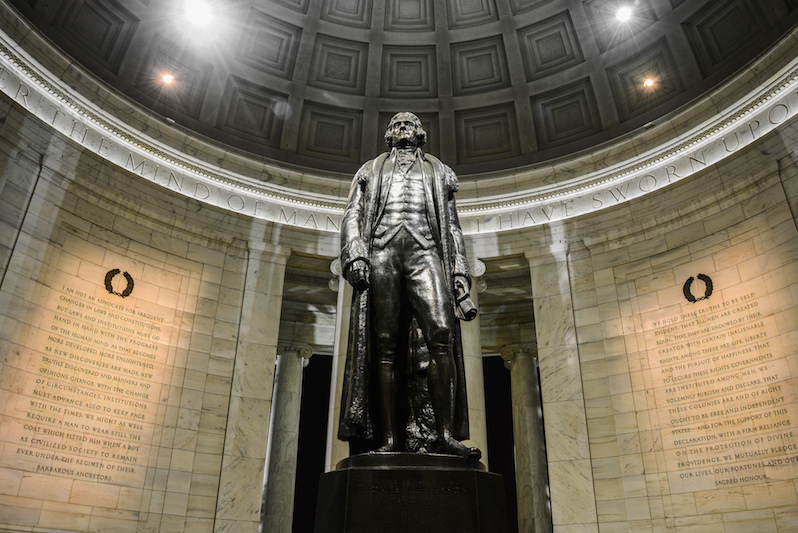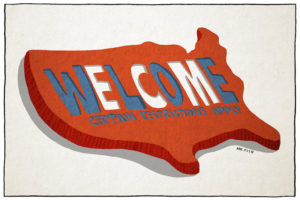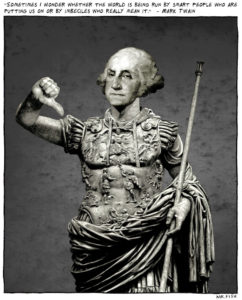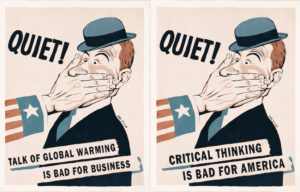Reimagine and Rebuild Our Broken Democracy — in Time for the Nation’s 250th Anniversary
The heavy chains of “present political possibility” should be cast off. In just 10 years, it will be the 250th birthday of the United States, and it is time to create a new political system. The Jefferson Memorial in Washington, D.C. (Graysick / CC SA-BY 3.0)
1
2
3
The Jefferson Memorial in Washington, D.C. (Graysick / CC SA-BY 3.0)
1
2
3
Consider just how much civic engagement might increase from some of these proposed reforms. Ranked-choice voting, proportional representation, a president chosen by nationwide popular vote — these kinds of things, in a stroke, would make citizens feel like their voices actually counted for something. And it would provide them with incentives to keep participating in the affairs of their communities long after Election Day as well.
The $64,000 question, of course, is how in our contemporary political environment any of these proposals might even be rationally considered, let alone result in real institutional transformations. Politics, after all, as every freshman knows, is “the art of the possible.” And hardly any of this seems politically possible at the moment.
But there’s a prior conversation before we even get to that conversation. We profoundly constrain our ability to imagine a brighter American future, an America 2.0, if we insist that every single idea be weighed down by the heavy ball and chain of “PPP” — present political possibility. No one will even begin to think about how to improve our American republic unless someone sets out to articulate what an optimal American republic might look like.
And it is precisely that kind of grand debate that ought to be launched — in the run-up to July 4, 2026, the United States of America at a quarter millennium.
While our nation turns 240 this year, Jefferson’s words above — now inscribed on the walls of the Jefferson Memorial — are not quite so old as that. They appear in a letter to one Samuel Kercheval dated July 12, 1816 — 200 years ago this month! One suspects that as the United States of America was celebrating its 40th birthday, the genius of Jefferson had already begun to detect flaws in our constitutional structures — and to suggest that our “laws and institutions” ought to evolve to match “the progress of the human mind.”
Now we stand not at our 40th birthday, but our 240th. And as we begin to look ahead to our 250th, it is time for us to take up the charge that Jefferson issued a long two centuries ago. Let us summon the philosophical imagination, the moral courage and the political will in the next decade to fashion for ourselves a more perfect kind of grown-up coat — one that will enable us to form a more perfect union for 250 more years to come.
Tad Daley, author of the book “Apocalypse Never: Forging the Path to a Nuclear Weapon-Free World,” published by Rutgers University Press, directs the Project on Abolishing War at the Center for War/Peace Studies. Follow him on Twitter @TheTadDaley.
Gregory Wright is a longtime board member of Southern California Americans for Democratic Action. Write to him at [email protected].
Your support matters…
SUPPORT TRUTHDIG
Independent journalism is under threat and overshadowed by heavily funded mainstream media.
You can help level the playing field. Become a member.
Your tax-deductible contribution keeps us digging beneath the headlines to give you thought-provoking, investigative reporting and analysis that unearths what's really happening- without compromise.
Give today to support our courageous, independent journalists.





You need to be a supporter to comment.
There are currently no responses to this article.
Be the first to respond.